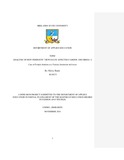Please use this identifier to cite or link to this item:
https://cris.library.msu.ac.zw//handle/11408/2822| Title: | Analysis of how feminists’ views have affected fashion and dress: a case of female students at a tertiary institution in Gweru | Authors: | Banda, Shirley | Keywords: | Feminist female students Fashion |
Issue Date: | 2016 | Publisher: | Midlands State University | Abstract: | This research sought to find out how the views of feminist female students at a tertiary institution in Gweru affected their choice of fashion and dress as well as how to minimize friction resulting from female students’ freedom of choice of dress being infringed upon. It aimed to establish the underlying reasons for students’ views that affected their dress, in answer to the main research question which was, “How have feminists’ views affected dress and fashion?” It also meant to come up with strategies for minimizing any friction on views on dress and fashion, in answer to the second research question – “How can freedom of dress and fashion be made more acceptable by female students at a tertiary institution in Gweru?” The study adopted the Interpretivist paradigm and the qualitative approach and employed a case study design. The eclectic theoretical framework encompassing the cognitive, the symbolic interactionist and feminist theories on dress informed the review of literature related to the study. Eight hundred and forty female students at the campus comprised the population (N=540) from which a convenience sample of eighty-two (n=82) participants was drawn. A questionnaire with both open-ended and closed questions was self-administered. The findings were analyzed thematically, without software. The study revealed that feminist female students’ views regarding patriarchy, power, identity, self-expression and freedom of expression affected their choice of dress in varying degrees. It revealed that friction on views on dress and fashion could result from meanings attached to dress, since dress communicates information about the wearer. It also emerged that increasing awareness on human rights, as well as providing androgynous styles could help ease the tension on views on dress and fashion. The research concluded with recommendations to educators to include WHO Life Skills such as communication, self-awareness, self-management and self-esteem, into the syllabus. In addition, Emotional Intelligence modules could also be taught from an early age to instill conflict-management skills into both males and females. Respect for human rights also needs emphasis. Fashion designers need to come up with unisex designs to cater for females who need the power they view is associated with masculine dress. Lastly, the researcher hopes that the study may stimulate interest in other researchers to carry out a comparative study on how male views have affected fashion and dress and if men also feel that their freedom of choice of dress is in anyway infringed upon, and how any such friction may be alleviated. | URI: | http://hdl.handle.net/11408/2822 |
| Appears in Collections: | Bachelor of Education in Fashion and Textiles |
Files in This Item:
| File | Description | Size | Format | |
|---|---|---|---|---|
| R13027J.pdf | Full Text | 2.33 MB | Adobe PDF |  View/Open |
Page view(s)
116
checked on Feb 24, 2025
Download(s)
56
checked on Feb 24, 2025
Google ScholarTM
Check
Items in MSUIR are protected by copyright, with all rights reserved, unless otherwise indicated.



